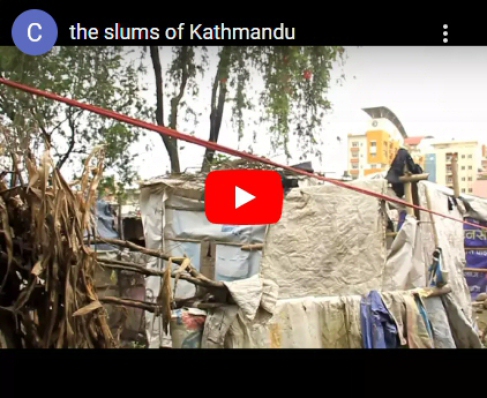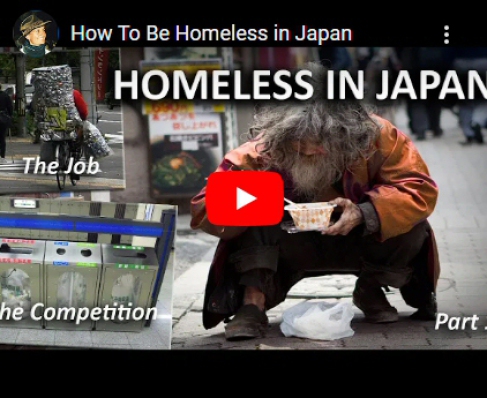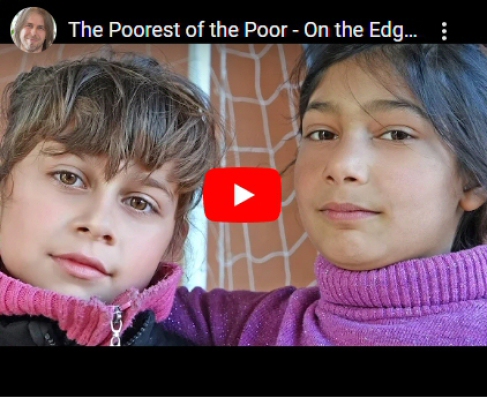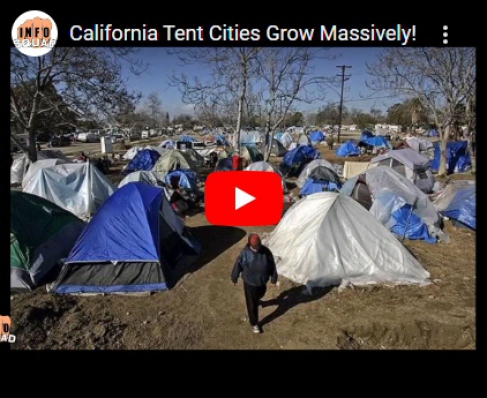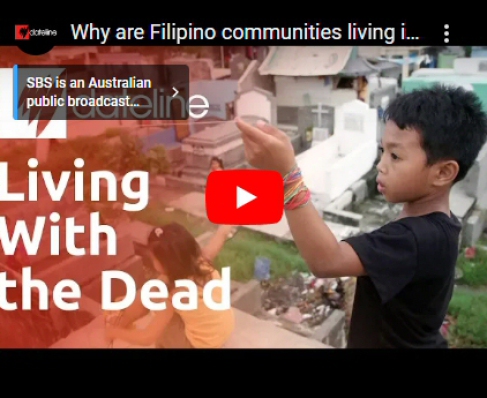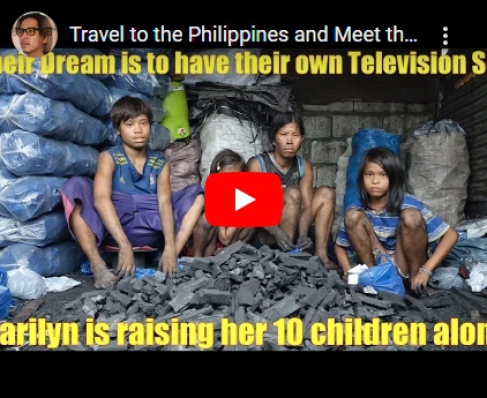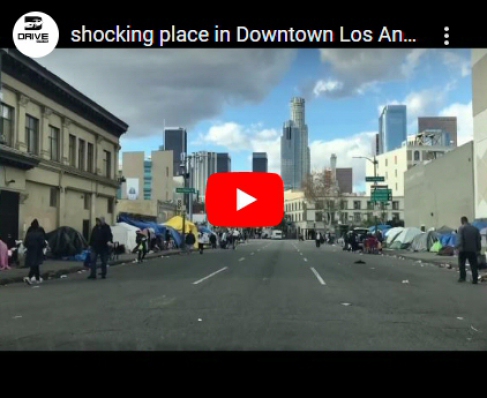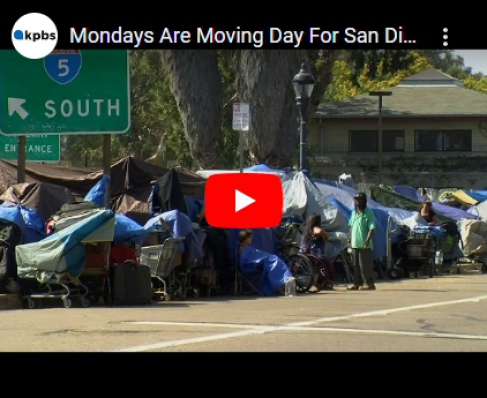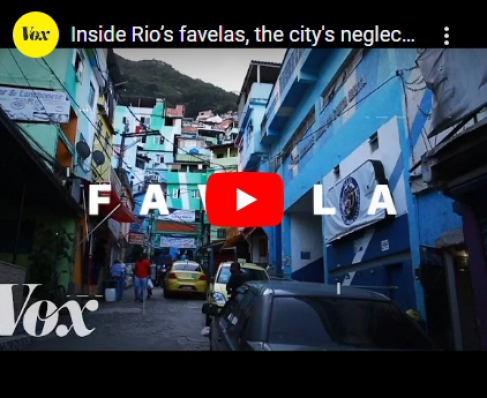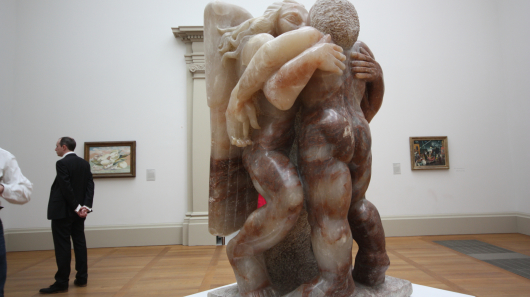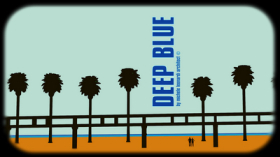The Outcasts
Level 5
side effects of civilisation,
the general indifference by people,
the night of the modern civilisations
don't forget us
Squalid living conditions
of Hong Kong's Poor Population
The slums of Kathmandu, Nepal
Italian twenty-year-olds' life
without studying or working
Germany’s Poor Pensioners
How To Be Homeless in Japan
Naples, Italy: Family lives in the car
My daily life in the slums of Mumabay, India
How Many Homeless in Each State.
It's not just California
Poverty in the Pandemic:
Americans in Corona-Fueled Economic Crisis
How to survive in Los Angeles - without a home?
DW Documentary
The Poorest of the Poor:
On the Edge of Europe
Turin, Italy: evicted, their car becomes home
In Rome, Italy, the migrant-unauthorized sweeper:
"In Nigeria I was an engineer,
here I want to integrate myself working"
California, U.S.A.: How Silicon Valley's housing
boom is creating a homeless crisis
California tent cities grow massively!
Living with the Dead
Japan's Hidden Poor
Inside France’s new shantytowns
Rome, Italy: 35,000 evicted,
an entire city without a home
Italians evicted, homes for the refugees.
It's a shame!
Record evictions in Turin, Italy
Italy: the reason why the rich
get rich more and more
A journey through the Bangkok slums, Thailand
India's 'Slumdog' Millions:
A glimpse of life in Bihar's slums, India
For Love or Money - The Slum
Poverty rates surge in American suburbs
Manila Slums:
Travel to the Philippines and meet the Poor.
Their dream is to have a television set
Shocking place in Downtown Los Angeles, U.S.A.
Inside the Dharavi slums of Mumbai, India
California, U.S.A.:
Mondays are moving day for San Diego’s Homeless
Brazil: Inside Rio’s favelas, the city's neglected neighborhoods
Natasha is 22 years-old and has been homeless sleeping rough in London for 4 years
Tent cities rise amid housing
shortage in Silicon Valley, California
"Jacob and the Angel" of Sir Jacob Epstein (1929-1959), 1941,
at Tate Britain Art Gallery in London. Photo by M.L., 2016.
BIBLIOGRAPHY
- David Harvey: "A brief History of Neoliberalism", Oxford University Press, United Kingdom, 2005.
Neoliberalism - the doctrine that market exchange is an ethic in itself, capable of acting as a guide for all human action - has become dominant in both thought and practice throughout much of the world since 1970 or so. Writing for a wide audience, David Harvey, author of The New Imperialism and The Condition of Postmodernity, here tells the political-economic story of where neoliberalization came from and how it proliferated on the world stage. Through critical engagement with this history, he constructs a framework, not only for analyzing the political and economic dangers that now surround us, but also for assessing the prospects for the more socially just alternatives being advocated by many oppositional movements.
- Colin Crouch: "The Strange Non-Death of Neo-liberalism", Polity Press, Cambridge, United Kingdom, 2011.
The financial crisis seemed to present a fundamental challenge to neo-liberalism, the body of ideas that have constituted the political orthodoxy of most advanced economies in recent decades. Colin Crouch argues in this book that it will shrug off this challenge. The reason is that while neo-liberalism seems to be about free markets, in practice it is concerned with the dominance over public life of the giant corporation. This has been intensified, not checked, by the recent financial crisis and acceptance that certain financial corporations are ‘too big to fail'. Although much political debate remains preoccupied with conflicts between the market and the state, the impact of the corporation on both these is today far more important.
Several factors have brought us to this situation. Most obviously, the lobbying power of firms whose donations are of growing importance to cash-hungry politicians and parties. The weakening of competitive forces by firms large enough to shape and dominate their markets. The power over public policy exercised by corporations enjoying special relationships with government as they contract to deliver public services. The moral initiative that is grasped by enterprises that devise their own agendas of corporate social responsibility.
Both democratic politics and the free market are weakened by these processes, but they are largely inevitable and not always malign. Hope for the future, therefore, cannot lie in suppressing them in order to attain either an economy of pure markets or a socialist society. Rather it lies in dragging the giant corporation fully into political controversy. Here a key role is played by the small, cash-strapped campaigning groups who, with precious little help from established parties, seek to achieve corporate social accountability.
- Michel Chossudovsky: "The Globalisation of Poverty. Impacts of IMF and World Bank Reforms", Zed Books Publisher, London, United Kingdom, 1997, 2003 extended edition.
The author of this book contends that the reality of free trade and globalization is impoverishment for growing numbers of people. What is more, the unemployment and marginalization are not confined to the Third World, but also exist in the rich countries and the former Soviet Union. This overview of macroeconomic disaster in the making explains how and why the processes are related. It shows how structures of the global economy have changed fundamentally since the early 1980s, and how the leading international financial institutions, notably the IMF and the World Bank, have forced Third World and Eastern European countries to facilitate these changes. The consequences of the new financial order, as the author's examples from all parts of the world show, is a globalization of poverty.
- Jean Ziegler: "Les nouveaux maîtres du monde et ceux qui leur résistent" ("The new rulers of the world and those who resist them"), Librairie Arthème Fayard, Paris, France, 2002.
Aujourd'hui (2003) dans le monde, tous les jours, 100 000 personnes meurent de faim ou de ses suites immédiates, victimes d'un impératif et d'un seul, imposé par les maîtres du monde le profit sans borne. Au cœur du marché globalisé, banquiers, hauts responsables de société transnationale, opérateurs du commerce mondial accumulent l'argent, détruisent l'Etat, dévastent la nature et les êtres humains. Ce livre révèle leur visage, analyse leur discours, dénonce leurs méthodes, et les mercenaires qui les servent, au sein de l'OMC, de la Banque mondiale et du FMI, et démonte l'idéologie qui les inspire, jetant une lumière crue sur le rôle joué par l'empire américain. Face à ces nouveaux maîtres, la résistance s'organise. C'est la nouvelle société civile planétaire dont Jean Ziegler montre ici la richesse, la diversité et la détermination.
- John Ralston Saul: "Voltaire's Bastards: The Dictatorship of Reason in the West", Vintage Books Publisher, New York City, U.S.A., 1993.
In this provocative analysis of modern society, John Ralston Saul shows that throughout the West there is a crisis, due largely to our blind faith in reason. Instead of a basis for ethical behavior, reason is often reduced to mere practicality. If we continue to allow process-minded experts, “Voltaire’s bastards,” to run society, we risk the breakdown of our legal, financial, and cultural systems, thus endangering our societies.
- Autori Vari: "La povertà a Roma: un punto di vista. Anno 2019", Caritas Roma, Roma, 2019, http://www.caritasroma.it/2019/11/gli-equilibristi-della-poverta/ :
Gli “equilibristi della povertà” sono le persone che hanno un reddito sufficiente a pagare un affitto o anche un mutuo, ma che riescono a malapena a pagarsi di che mangiare o a pagare le utenze. Una vulnerabilità che li fa camminare costantemente sull’orlo del precipizio della povertà vera e propria, in cui cadono di fronte a imprevisti anche minimi. È questo il dato che emerge dal terzo Rapporto “Povertà a Roma: un punto di vista” realizzato dalla Caritas di Roma e presentato oggi presso il Vicariato di Roma. La pubblicazione, 188 pagine ricche di dati e infografiche, riporta un quadro generale della situazione socio-economica della Capitale e tre ambiti di approfondimento su sovraindebitamento delle famiglie, l’esigibilità dei diritti e il problema casa. Non manca anche un report sull’attività dei 157 centri di ascolto promossi dalle parrocchie romane.
Documento Adobe Acrobat [4.0 MB]
- Claudia Astarita: "Cina: reddito di cittadinanza finanziato col turismo", Articolo sulla rivista Panorama, 2018: L I N K .
Alloggio, lavoro, assistenza sanitaria e contributi pensionistici garantiti ai poveri che vivono nelle campagne. Dalle aziende private.
- Amin Maalouf: "Il naufragio delle civiltà", 346 pgg., La nave di Teseo, Milano, 2019.
Amin Maalouf ha il potere di proporre intuizioni esatte quanto predizioni, indovinando i grandi cambiamenti della storia e della società molto prima che affiorino alla coscienza comune. In questo libro, con la lucidità cui ci ha da tempo abituati, spiega perché si sia arrivati alle soglie di un naufragio globale, che riguarda tutte le civiltà. L'America, per quanto resti una superpotenza, è sul punto di perdere ogni credibilità morale. L'Europa, che aveva promesso al suo popolo e a tutto il mondo il progetto più ambizioso e rassicurante della nostra epoca, sta per smembrarsi. Il mondo arabo-musulmano versa in una crisi profonda che lascia la sua popolazione nella disperazione e con ripercussioni spaventose ovunque. Grandi nazioni emergenti o in via di rinascita, come la Cina, l'India e la Russia, fanno irruzione sulla scena mondiale in un'atmosfera deleteria in cui vige la legge del più forte. Una nuova corsa agli armamenti sembra inevitabile, senza contare le minacce, gravissime, che pesano sul nostro pianeta - il clima, l'ambiente, la salute - e alle quali non potremo far fronte senza quella solidarietà globale che, appunto, ci manca. Da tanti anni, Amin Maalouf osserva e percorre il mondo, da Beirut a Teheran, dal Vietnam a Parigi.
- Alessandro Coppola: "Apocalypse town. Cronache della fine della civiltà urbana", 232 pgg., Laterza, Bari e Roma, 2012.
Nel cuore dell'America ci sono città sull'orlo della dissoluzione. Assomigliano, sempre di più, a campagne post-urbane. Un nuovo paesaggio che nella cintura di ruggine - la cosiddetta Rustbelt, che si estende dal Midwest fino a parte del Nordest del paese - è diventato molto comune. Con le fabbriche e i negozi del suburbio abbandonati, distrutte dagli incendi e dalle rivolte razziali degli anni Sessanta e Settanta, da queste città è fuggita più della metà degli abitanti. Lasciandosi alle spalle macerie e popolazioni immiserite, che ogni giorno lottano per la sopravvivenza in un ambiente sempre più ostile. Dalle praterie urbane di Youngstown, dove l'amministrazione comunale si è ormai ridotta a pianificare con zelo l'autodistruzione della città, all'industria del riciclo e della decostruzione di Buffalo, dove attivisti visionari smontano con dovizia e con amore ciò che resta della città; dai deserti alimentari di Detroit e Philadelphia, dove sono scomparsi negozi e supermercati e gli abitanti si organizzano con geniali intraprese agricole, fino alle città come New York che puntano sull'agricoltura urbana, per costruire città più sostenibili grazie a un perfetto metabolismo naturale. Questo è il racconto di territori e popolazioni che non fanno parte delle rappresentazioni consolidate a cui siamo abituati, storie di persone che inventano nuovi modi di vita in ambienti in cui a essersi dissolta - forse per sempre - è la società contemporanea per come la conosciamo.
- Marco Della Luna: "Oligarchia per popoli superflui. L'ingegneria sociale della decrescita infelice", 319 pgg., Ed. Aurora Boreale, 2018.
Nella società globalizzata i popoli sono divenuti superflui perché gli attuali metodi di produzione del potere politico e della ricchezza – metodi tecnologici e finanziari – da un lato si sono accentrati nel controllo di poche grandi famiglie dinastiche – un’oligarchia che decide a porte chiuse sopra quanto rimane delle istituzioni delle democrazie formali nazionali – e dall’altro non necessitano delle masse di lavoratori, consumatori, combattenti di cui necessitava il capitalismo industriale produttivo. Conseguentemente, cittadini e lavoratori hanno perso la loro capacità di negoziare. Questa è la ragione materiale per cui stanno perdendo reddito, diritti, sicurezze, voglia di far figli: la decrescita infelice. Ma una corsa a crescente velocità verso crescenti squilibri è automaticamente una corsa verso un’inevitabile rottura di sistema. Oligarchia per popoli superflui è un libro che tutti dovrebbero leggere, soprattutto in ambito universitario, affinché possa concretizzarsi un auspicato sgretolamento di quegli obsoleti paradigmi che ingabbiano l’evoluzione della cultura, dell’informazione e della Conoscenza e si venga a creare, fra gli studenti di oggi (padri di famiglia e lavoratori del domani) una nuova consapevolezza riguardo al ruolo non del semplice cittadino (troppo spesso inteso come un numero o come il mero ingranaggio di una macchina), ma dell’essere umano nella propria integralità, per l’edificazione di un nuovo Umanesimo e di un nuovo Rinascimento.


